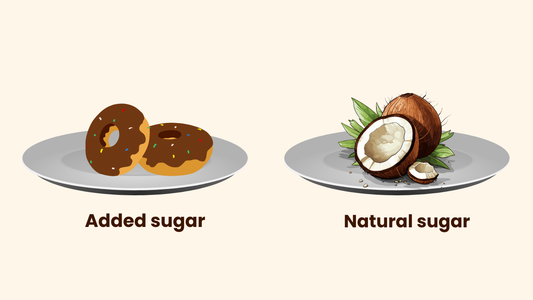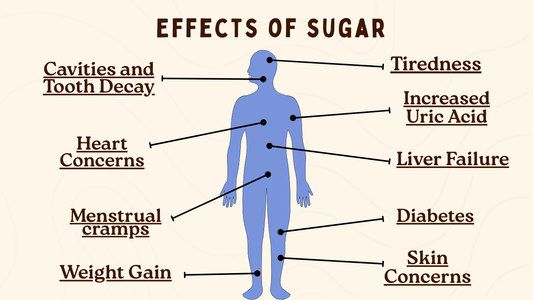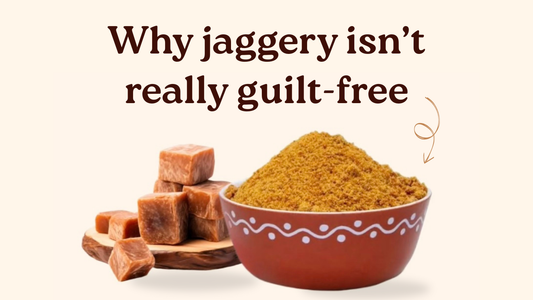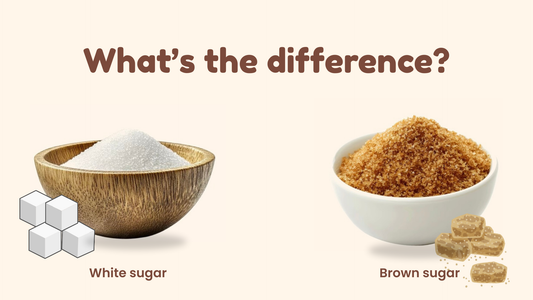Why People Swap Sugar for Honey
For centuries, honey has carried a golden reputation. It’s marketed as natural, wholesome, medicinal, and even sacred in many cultures. In India, Ayurveda has praised honey for its healing properties. In the West, health influencers promote it as a “better sugar.” Parents often give their kids honey instead of sugar in milk, or use it to soothe sore throats.
But here’s the big question: Is honey really healthier than sugar? Or is it another sweet illusion?
To answer this, we’ll dive into the science, compare honey and sugar side by side, bust the myths, and see what it really means for your health.
What Exactly Is Honey?
Honey is a natural sweetener made by bees. Worker bees collect nectar from flowers, partially digest it, and store it in honeycombs. Through evaporation and enzyme action, nectar becomes the thick, golden liquid we call honey.
Composition of Honey
On average, honey is:
• Fructose: 38%
• Glucose: 31%
• Water: 17%
• Other sugars: 9% (maltose, sucrose, etc.)
• Vitamins & minerals: Trace amounts (potassium, magnesium, iron, B vitamins).
• Antioxidants: Polyphenols, flavonoids (these are what give honey medicinal properties).
Compare this to white sugar (sucrose):
• 100% sucrose (glucose + fructose linked together).
• No antioxidants, no vitamins, no minerals.
At first glance, honey looks more complex and nutrient-rich. But let’s see if that actually makes a health difference.
Calories: Honey vs Sugar
• 1 tablespoon honey (21 g): ~64 calories
• 1 tablespoon sugar (12.6 g): ~49 calories
👉 Honey has more calories per tablespoon because it’s denser.
However, honey is also sweeter than sugar, so you might use less of it. This partly balances the difference.
Glycemic Index: How They Affect Blood Sugar
• Honey GI: ~58 (varies by type; acacia honey is lower, clover honey higher)
• White sugar GI: ~65
Both cause blood sugar spikes, but honey raises glucose slightly slower due to its higher fructose content.
Important note:
• Fructose doesn’t raise blood sugar directly, but in excess it stresses the liver, leading to fat buildup and insulin resistance.
• For diabetics, both honey and sugar must be limited. Honey is not a free pass.
Health Benefits of Honey (Where It Does Win)
Unlike sugar, honey isn’t empty calories. It contains bioactive compounds that give it medicinal value.
1. Antioxidant Power
Honey has polyphenols and flavonoids that reduce oxidative stress and may protect against heart disease. Darker honeys usually have more antioxidants.
2. Antibacterial and Wound-Healing Properties
Raw honey, especially Manuka honey from New Zealand, is used in medicine to heal wounds and fight infections. Its natural hydrogen peroxide and methylglyoxal content give it antibacterial strength.
3. Sore Throat & Cough Relief
Several studies show honey is as effective as some over-the-counter cough medicines for soothing the throat, especially in children (not for infants under 1 year).
4. Potential Anti-Inflammatory Effects
Honey has compounds that may lower inflammation markers in the body.
But here’s the catch: You only need a teaspoon for these effects. Eating honey by the tablespoon daily cancels benefits because of the sugar load.
The Myths About Honey
1. “Honey doesn’t raise blood sugar.”
False. It absolutely does - just slightly slower than sugar.
2. “Honey is safe for diabetics.”
False. Diabetics must limit honey just like sugar. Small amounts may be better tolerated, but it’s not medicine.
3. “Honey has lots of vitamins and minerals.
Misleading. It does contain nutrients, but in tiny, insignificant amounts. You’d need cups of honey to get meaningful nutrition.
4. “Honey helps with weight loss.”
Not true. It’s still calorie-dense. Replacing sugar with honey without cutting overall intake won’t cause weight loss.
|
Compound |
Glycemic Effect |
Insulin Response |
Other Effects |
Risks/Concerns |
|
Monk Fruit Extract (mogrosides) |
None |
Reduced post-prandial |
Antioxidant, anti-inflammatory, may reduce sugar cravings |
Minimal human safety concerns so far |
|
Erythritol |
Zero |
Minimal |
Satiety modulation, weight-supportive in rodents |
Emerging vascular concerns, GI discomfort possible |
|
Sucrose (table sugar) |
High |
High |
Caloric energy, rapid glucose load |
Obesity, diabetes, insulin resistance |
What Science Says
• A review in the Journal of Clinical & Diagnostic Research (2018) found that honey may lower fasting blood sugar compared to sugar in some cases, but overall effects are small.
• A study in the International Journal of Food Science and Nutrition (2019) showed honey has antioxidant and anti-inflammatory potential, but benefits disappear at high doses.
• The American Diabetes Association states honey should be counted as an added sugar - not a free alternative.
The Real Health Perspective
Yes, honey is “better” than sugar in some ways. It has antioxidants, healing properties, and a lower glycemic index. But at the end of the day, honey is still sugar.
• Too much honey = weight gain, blood sugar spikes, and risk of chronic diseases.
• The health benefits only appear at low doses (1–2 teaspoons).
So the smarter approach isn’t replacing all sugar with honey. It’s reducing overall added sugar intake — and saving honey for flavor or specific medicinal uses.
The Better Alternative: Monk Fruit
Unlike honey or sugar, monk fruit sweetener provides sweetness without calories, carbs, or blood sugar spikes.
• 100–200x sweeter than sugar, but contains zero glucose/fructose.
• Safe for diabetics, kids, and weight management.
• Used in traditional Chinese medicine for centuries.
• At EPRA Farms, our monk fruit sweetener blends keep it clean: just monk fruit extract + erythritol, no artificial additives.
This is the real solution for people who want sweetness without side effects.
Final Verdict: Honey vs Sugar
• Taste & health edge: Honey wins, thanks to antioxidants and medicinal uses.
• Blood sugar impact: Nearly the same. Not diabetic-safe.
• Calories: Honey has more per spoon, though you may use less.
• Health benefits: Real but only in small doses.
👉 If you love honey, use it sparingly - as a drizzle on fruit, in tea, or for cough relief. But don’t treat it as a daily “healthy sugar.”
👉 If your goal is better health, weight management, and stable blood sugar, the best move is cutting added sugars altogether and switching to natural alternatives like monk fruit.





